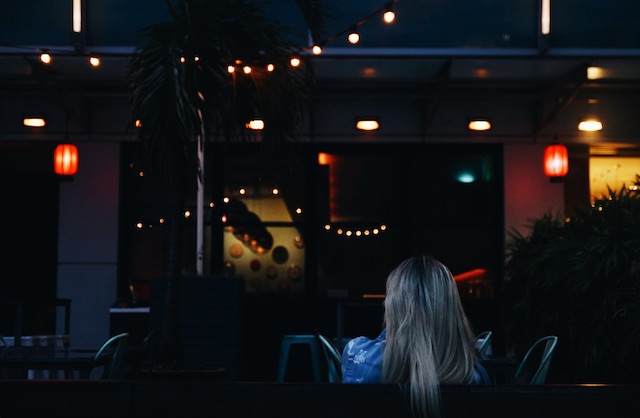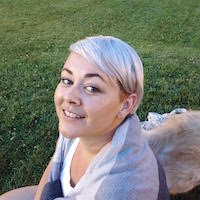
When I quit drinking, I was terrified my life would change.
I was afraid my friends and relationships would disappear, and that I would have to face a completely different and probably terrible life.
In the two and a half years that followed, that premonition has proven both totally accurate and totally false, sometimes concurrently, and always in ways I couldn’t have predicted.
Some friends did disappear, but not right off the bat.
At first, everyone was the same, but I was sober. I did the same things—meeting people at a bar seemed like the only way to socialize, so that’s how I spent time with my friends. And it wasn’t terrible! Jokes were still funny. I laughed less than I used to after six beers, but the laughter and conversation felt more real and authentic. I thought, “I can do this forever. Being sober is great!”
However, the part of the drinking lifestyle that haunted me was an intense nostalgia for staying at a bar till close—or after—and getting really deep with someone, especially a newer friend or someone I’d lost touch with. That’s a great feeling.
But if I’m being honest with myself, connection wasn’t the primary experience of those evenings. Connection happened, and years later I could (foggily) recall feelings of closeness and specialness during those hours with that person. But the actual reality of those nights usually resulted in me waking up the next morning and texting my drinking companion frantically:
“How did I get home? OMG, I feel dead,” and
“Are you ok? I’m sorry I said [insert maudlin/embarrassing/bitchy/dramatic/gossipy comment]. I hope you’re not mad!”
Then, I’d spend the day in a shame spiral.
The best way I coped was by overeating to suffocate those shameful feelings and replace them with fat guilt—a private shame that I was independently witness to and responsible for. The worst way I coped was by distracting myself with a new night out that normalized my behavior, which, by the end of my drinking life, was usually what happened.
During my drinking life, I would go to the bar, where the night was filled with endless possibility. Anything could happen! I often met new people or started talking to friends I’d run into. I hung out with whoever would keep drinking with me.
There’s a sense of excitement to that, sure. But “anything can happen” also means that I’m choosing nothing: I’m an unfixed point of chaos and I’ll let my time go anywhere and to anyone.
One time, it even meant waking up in my bed alone and wondering why my pants were on inside out.
Once I’d gotten to the reality of feeling loss surrounding those nights, I stopped wanting to go to bars.
I noticed I was often bored at the bars. And tired. I started keeping a responsible sleep schedule that made my body and mind feel calm and balanced. But it wreaked havoc on my social life. To counteract that, I started spending one-on-one time with friends during the day, usually centering around an activity of some sort: yoga, a walk, lunch, coffee, or a movie. Inviting people I wanted to spend time with to do activities I wanted to do—and was going to do regardless—helped me connect with friends in a healthier way.
The actual revolution within my life began with those two things happening at the same time: going to bars less and scheduling one-on-one hangs with friends on my terms. So yes, it started with sobering up, but the actual, discernible changes in my life were brought about by the way I empowered myself to choose how and with whom I spent my time.
And those friends I didn’t set up dates with? Well, we lost touch. And that’s okay.
I’d been spinning my wheels trying to maintain too many relationships anyways. And those drunken nights that I fell into were false senses of closeness. If I wanted to see someone, I would call them, or the world would conspire to put us in the same place. And if that didn’t happen, then our relationship was never a choice, it was what happened to us. The initial burning off of that outer ring of acquaintances was necessary, and it largely felt good.
But then the next ring started to burn off. Those were the people who only saw me because it was convenient for them. They fell into me and when I tried to choose them, they didn’t choose me back. I still had a small merry band of folks willing to talk on the phone and connect socially, so that second ring stung, but it didn’t hurt too badly.
And the power I reclaimed when I realized that honoring my own choices and happiness were more important than seeing those people was so life-giving that it was easy to talk myself through the loss and see the gain that it ultimately was.
At this point, I was about a year into sobriety. And that is when sh*t hit the fan, because I started to act and react from that place of reclaimed power. This is when I began to lose people who I had thought were my forever folks—my inner circle. I had thought that no matter what, we were in this life together. And maybe some of us are, but I don’t know how it ends yet, or the ways they’ll reappear in my life are unknown to me. But they’ve been gone for a while now, and it’s taken me—is still taking me—a huge amount of work to accept that. It’s sad, it hurts, it sucks, and it makes me want to cry. So sometimes, I cry.
What happened is that I discovered that having a choice, choosing, means listening to what I want. And I am not as easy-going as I thought I was.
Once I figured out that I wanted things, I really wanted them! When I took a step in the direction to get them, then the not-getting felt like fatal blow. No wonder I never did this before. It’s hard to say you want something to begin with—to me, it feels selfish. It’s work to own the truth that Wanting (capital W) is my birthright. The reality of being left wanting is so cosmically sad, so sorrowful, that I wish I could go back to being okay with whatever. But I can’t. It doesn’t work like that.
Going into a relationship with a person in a mutually respectful way required me to ask for what I wanted, sometimes more from a person and sometimes less. What I mean by this is that as I was doing personal work and paying attention to me for the first time, I noticed the friends whose company I left feeling lighter and better. That’s the goodness. I know now to keep that. I want more of that and I want the person I’m asking that of to want it with me, too. Many did and those are my closest and most fruitful and nurturing relationships.
Some didn’t. And trying to maintain our previous closeness in a way that was true to my expanding self was emotional suicide. That’s the poison, that’s where you need to steer clear. And even though my decision to stay away is conscious and filled with self-love, it is so painful to act on loving myself more than I love those particular individuals. It’s the ultimate Choosing (capital C). I believe that, eventually, I will feel more wholly myself and empowered by my choice. But right now, it feels like I’m making a horcrux.
Here’s the thing, though: a lot of those people were choosing themselves throughout the entirety of our relationship.
I just went along, not having the strength or courage to even ask myself what it was exactly that I wanted from them or with them. I took scraps, gladly. They certainly cared about me and loved me and wished me well, but they also never asked me to sacrifice myself for them and their happiness with me. I did that all on my own.
This realization made me think I knew nothing. That my intuition with people—a trait I highly prized—was off-kilter. I learned about projection and then nothing made sense. I had to rebuild from square one. I couldn’t make any assumptions about why people said or did the things they said and did. I had to tune into myself first and stay there while I navigated relationships. And I had to rigorously question my instincts. Because, in my courageous new selfhood, if I didn’t know how someone felt, I asked them. And my accuracy percentage was low. In one particularly heartbreaking case, it was so off the mark that it shook my entire foundation of what I knew.
I’m not on the other side of that, yet. But I am over the apex of it. I think. I hope.
My former concept of intuition was never based around me—it was always centered on someone else and the ways I could meet their needs.
That’s not intuition, by the way, it’s absolutely codependence and partly a delusional fortune teller aspect of myself: a great Halloween costume, but a piss poor way of living your life. And what I’m left with is a less certain intuition, but one that is built around me and my heart and my needs.
If I can be in the world knowing with certainty what I want and where my next steps will be, then I consider myself in a good space. It’s all I can ask for.
~
Author: Alexis Farrell
Image: Suhyeon Choi/Unsplash
Apprentice Editor: Sarah Crosky; Editor: Emily Bartran
~






Read 1 comment and reply